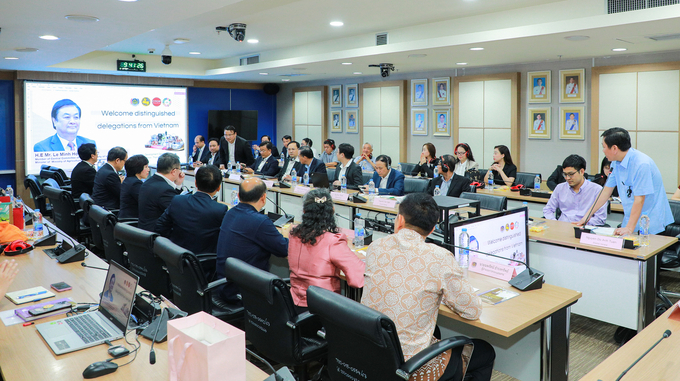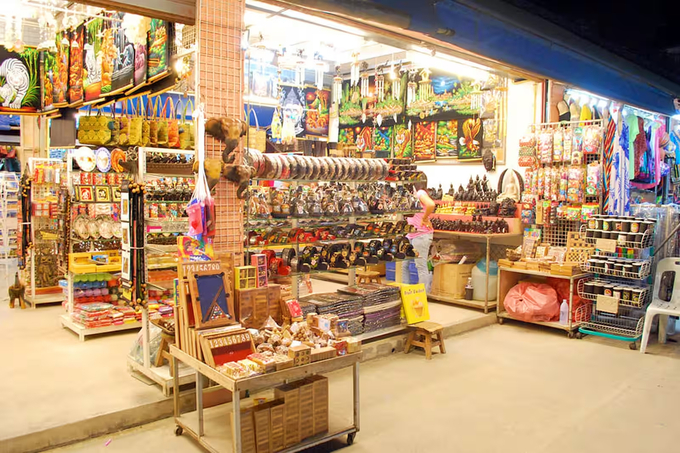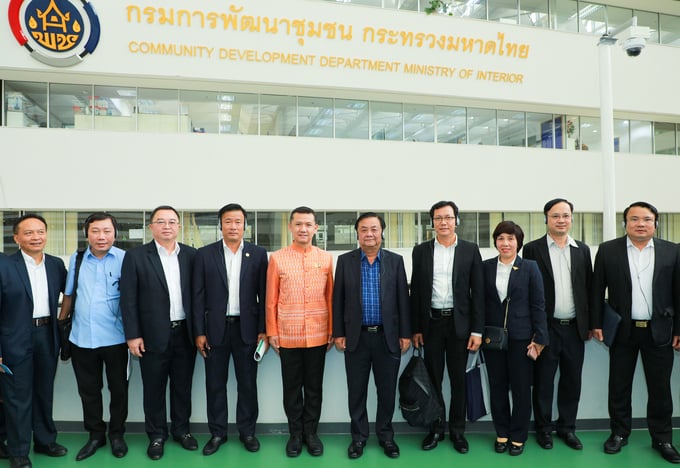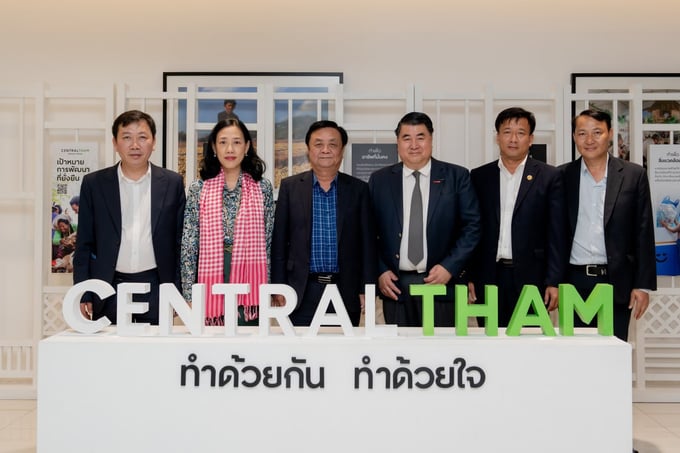June 17, 2025 | 06:56 GMT +7
June 17, 2025 | 06:56 GMT +7
Hotline: 0913.378.918
June 17, 2025 | 06:56 GMT +7
Hotline: 0913.378.918

The working session between the delegation from the Ministry of Agriculture and Rural Development and the Community Development Department, Ministry of Interior of Thailand.
Thailand's OTOP program, similar to Vietnam's, implements the Japanese One Village One Product (OVOP) concept in an effort to improve the standard of living of the people, economic infrastructure, and community culture. Boasting over 20 years of formation and development, Thailand desires to cooperate with Vietnam for joint trade promotion of local agricultural products.
Mr. Chayachai Seangin, Deputy Director of the Department of Community Development at the Ministry of the Interior of Thailand, clarified upon the fundamental objective of OTOP (One Tambon One Product) in bolstering self-sufficient economic development.
The OTOP strategy produces essential agricultural products with the assistance of local labor, resources, and knowledge, while mitigating negative environmental and natural resource impacts. By establishing a robust network among professional organizations, cooperation between Thai government agencies and local authorities would be strengthened.
Thailand has accumulated 211,624 OTOP products, including nearly 4,000 five-star products, since the program's beginning in 2001. 94,181 enterprises and entities along the agricultural product value chain have participated in this program.

The OTOP product market in Patong, Thailand.
In addition to promoting the growth of domestic agricultural exports and trade, the OTOP movement places significant emphasis on the conservation of indigenous knowledge. Under the auspices of the Institute of Wisdom and Local Knowledge, Thailand has established seven OTOP Academies staffed by more than 6,000 officials who assist in product development.
Deputy Director Seangin elaborated: "To promote the development of the community economy, we even encourage office workers in Thailand to put on woven garments sourced from villages that feature OTOP products. In contrast, the Thai government will provide assistance to villages that produce OTOP products with regard to trademark registration, brand development, communication direction, and community knowledge training. Our primary objective is to ensure the sustainable development of rural areas across the nation while preserving the tenacity of traditional craft villages."
The head of the Department of Community Development evaluated several aspects of the Thai OTOP and the Vietnamese OCOP. Both nations initially aim to introduce premium local products to the world, the Southeast Asian market at first.
Minister Le Minh Hoan concurred and stated, "Our two nations share numerous future trajectories, particularly with regard to fostering community tourism connectivity." Additionally, Thailand promotes the development of homestay models, encourages travelers to purchase local OTOP products, and draws them to rural areas to learn more about the origins of regional specialties.
As a result, the Ministry of Agriculture and Rural Development's leadership believes that Vietnam could learn a great deal from Thailand's OTOP program. To illustrate, the experiential economy is enhanced through activities such as tasting OTOP products, signing contracts with Thai airlines to serve passengers, organizing exhibitions three times a year, and promoting e-commerce on platforms like Shopee and Lazada.

Minister Le Minh Hoan took a group photo with Deputy Director of the Community Development Department, Chayachai Seangin.
"We anticipate soon arranging learning visits for delegations of Vietnamese officials and experts to your nation. Additionally, our countries can work together to coordinate trade shows and transport Thai OTOP products to Vietnam for promotional purposes, and vice versa. Additionally, the exchange of Thailand's experience in administering more than two hundred thousand products would contribute to the improvement of Vietnam's system," Minister Le Minh Hoan suggested.
Furthermore, on February 22, a delegation representing the Ministry of Agriculture and Rural Development, accompanied by Vietnamese enterprises, paid a visit to the leadership of Central Group and Central Retail Vietnam, where they engaged in discussions.
Throughout the meeting, Ms. Jariya Chirathivat, Legal Representative of Central Retail Vietnam and Deputy CEO of Business Development at Central Group, provided additional business-related insights regarding the enhancement of cooperation between Thailand's OTOP and Vietnam's OCOP.

Minister Le Minh Hoan visited and held discussions with the leadership of Central Group.
"Since the early 2000s, we have provided support to the Thai government during the OTOP program's implementation. Over the past five years, Central Group has significantly improved OCOP products via the Good Goods initiative, which signifies products that are excellent and continually improving. Through this Good Goods initiative, we engage in community collaboration to create superior products that outperform conventional alternatives by a factor of three to four," explained Ms. Jariya Chirathivat.
Minister Le Minh Hoan conveyed a sense of optimism regarding the prospects for increasing agricultural collaboration between Vietnam and Thailand following the visit.
Thailand's agricultural sector is designed to promote economic self-sufficiency, prioritizing the implementation of efficient strategies that yield advantages for farmers, particularly those who own smallholdings. The Thai Royal Family and government place a high value on agriculture, emphasizing "self-sufficiency" as the condition where the majority of the populace in every region and territory can independently produce and consume food. This philosophical approach is applied in its entirety across three tiers: communal settings, individual farm households, and villages.
Translated by Linh Linh

(VAN) The working delegation from the Ministry of Agriculture and Environment conducted an important trip to the Netherlands to strengthen strategic partnerships and sustainable development in the agricultural sector.

(VAN) The letter ‘A Plea from the Ocean’ not only evokes emotion but also awakens the human conscience to the responsibility of protecting life on Earth.

(VAN) The Department of Agriculture in South Africa has announced the country’s first mass vaccination of poultry to prevent local birds from contracting avian influenza.

(VAN) Establishment of the Mekong Delta Regional Agricultural Linkage Center, aiming for a closed value chain, deep processing, trading platforms, and international market connectivity.

(VAN) Gia Lai province has recently recorded 460 rare species of animals and plants, contributing to forest conservation and biodiversity planning in the region.

(VAN) Ms. Caroline Beresford, New Zealand Ambassador to Vietnam, expressed confidence that agricultural cooperation between Vietnam and New Zealand will develop sustainably, be climate-resilient, and promote gender equality.

(VAN) Vietnam reaffirms its commitment to international cooperation in fostering sustainable and responsible fisheries while ensuring resilient livelihoods for small-scale fishing communities.